There's a Book for That: Psychology's Top 12
April 18, 2018
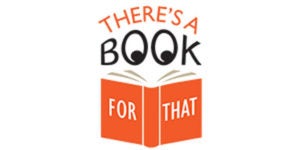 Have you read 12 RULES FOR LIFE? It’s the bestseller from Canadian Psychology Professor Jordan Peterson, a widely cited scholar of personality. The New York Times’ David Brooks calls Dr. Peterson “the most influential public intellectual in the Western world right now.” The popularity of his book reveals once again the appeal of thinkers who make sense out of the uncertainties of the human condition, i.e. offer antidotes. Those of us in publishing know also the power of finite numbers, so we’ll take the number and run. Here are Penguin Random House’s current top 12 psychology titles. Recurrent themes of community, surviving trauma, solitude, brain science and their applications for professional and personal success are meant to assist you on your journey:
Have you read 12 RULES FOR LIFE? It’s the bestseller from Canadian Psychology Professor Jordan Peterson, a widely cited scholar of personality. The New York Times’ David Brooks calls Dr. Peterson “the most influential public intellectual in the Western world right now.” The popularity of his book reveals once again the appeal of thinkers who make sense out of the uncertainties of the human condition, i.e. offer antidotes. Those of us in publishing know also the power of finite numbers, so we’ll take the number and run. Here are Penguin Random House’s current top 12 psychology titles. Recurrent themes of community, surviving trauma, solitude, brain science and their applications for professional and personal success are meant to assist you on your journey:
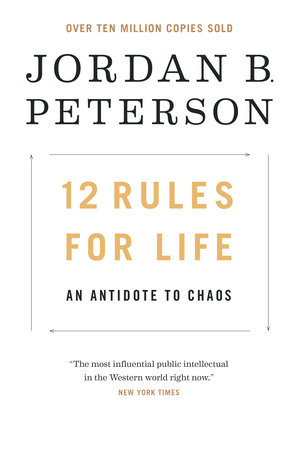 12 RULES FOR LIFE: AN ANTIDOTE TO CHAOS by Jordan B. Peterson
What does everyone in the modern world need to know? Renowned psychologist Jordan B. Peterson’s answer to this most difficult of questions uniquely combines the hard-won truths of ancient tradition with the stunning revelations of cutting-edge scientific research. Humorous, surprising and informative, Dr. Peterson tells us, among other things, why skateboarding boys and girls must be left alone, what terrible fate awaits those who criticize too easily, and why you should always pet a cat when you meet one on the street. 12 Rules for Life shatters the modern commonplaces of science, faith and human nature, while transforming and ennobling the mind and spirit of its readers. (Available as an audiobook on May 8th).
12 RULES FOR LIFE: AN ANTIDOTE TO CHAOS by Jordan B. Peterson
What does everyone in the modern world need to know? Renowned psychologist Jordan B. Peterson’s answer to this most difficult of questions uniquely combines the hard-won truths of ancient tradition with the stunning revelations of cutting-edge scientific research. Humorous, surprising and informative, Dr. Peterson tells us, among other things, why skateboarding boys and girls must be left alone, what terrible fate awaits those who criticize too easily, and why you should always pet a cat when you meet one on the street. 12 Rules for Life shatters the modern commonplaces of science, faith and human nature, while transforming and ennobling the mind and spirit of its readers. (Available as an audiobook on May 8th).
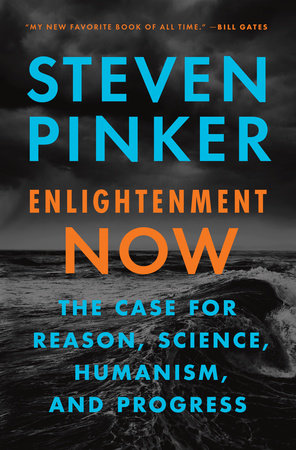 ENLIGHTENMENT NOW: THE CASE FOR REASON, SCIENCE, HUMANISM, AND PROGRESS by Steven Pinker
“My new favorite book of all time.”—Bill Gates
If you think the world is coming to an end, think again: people are living longer, healthier, freer, and happier lives, and while our problems are formidable, the solutions lie in the Enlightenment ideal of using reason and science.
ENLIGHTENMENT NOW: THE CASE FOR REASON, SCIENCE, HUMANISM, AND PROGRESS by Steven Pinker
“My new favorite book of all time.”—Bill Gates
If you think the world is coming to an end, think again: people are living longer, healthier, freer, and happier lives, and while our problems are formidable, the solutions lie in the Enlightenment ideal of using reason and science.
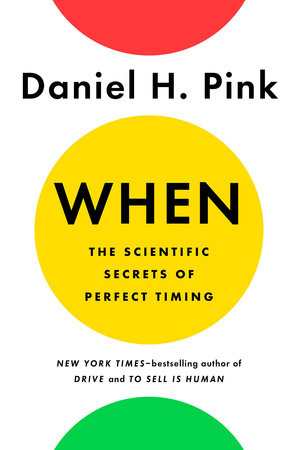 WHEN: THE SCIENTIFIC SECRETS OF PERFECT TIMING by Daniel H. Pink
Our lives are a never-ending stream of “when” decisions: when to start a business, schedule a class, get serious about a person. Yet we make those decisions based on intuition and guesswork. Timing, it’s often assumed, is an art. In When: The Scientific Secrets of Perfect Timing, Pink shows that timing is really a science. Drawing on a rich trove of research from psychology, biology, and economics, Pink reveals how best to live, work, and succeed.
WHEN: THE SCIENTIFIC SECRETS OF PERFECT TIMING by Daniel H. Pink
Our lives are a never-ending stream of “when” decisions: when to start a business, schedule a class, get serious about a person. Yet we make those decisions based on intuition and guesswork. Timing, it’s often assumed, is an art. In When: The Scientific Secrets of Perfect Timing, Pink shows that timing is really a science. Drawing on a rich trove of research from psychology, biology, and economics, Pink reveals how best to live, work, and succeed.
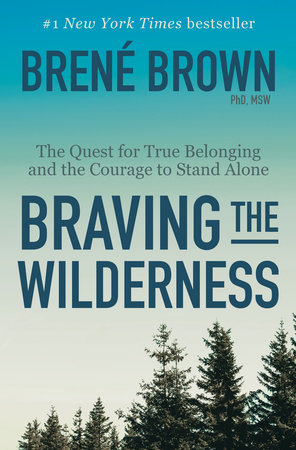 BRAVING THE WILDERNESS: THE QUEST FOR TRUE BELONGING AND THE COURAGE TO STAND ALONE by Brené Brown
A timely and important book that challenges everything we think we know about cultivating true belonging in our communities, organizations and culture. Brown argues that what we’re experiencing today is a spiritual crisis of disconnection, and introduces four practices of true belonging that challenge everything we believe about ourselves and each other. Brown writes, “The wilderness is an untamed, unpredictable place of solitude and searching. It is a place as dangerous as it is breathtaking, a place as sought after as it is feared. But it turns out to be the place of true belonging, and it’s the bravest and most sacred place you will ever stand.”
BRAVING THE WILDERNESS: THE QUEST FOR TRUE BELONGING AND THE COURAGE TO STAND ALONE by Brené Brown
A timely and important book that challenges everything we think we know about cultivating true belonging in our communities, organizations and culture. Brown argues that what we’re experiencing today is a spiritual crisis of disconnection, and introduces four practices of true belonging that challenge everything we believe about ourselves and each other. Brown writes, “The wilderness is an untamed, unpredictable place of solitude and searching. It is a place as dangerous as it is breathtaking, a place as sought after as it is feared. But it turns out to be the place of true belonging, and it’s the bravest and most sacred place you will ever stand.”
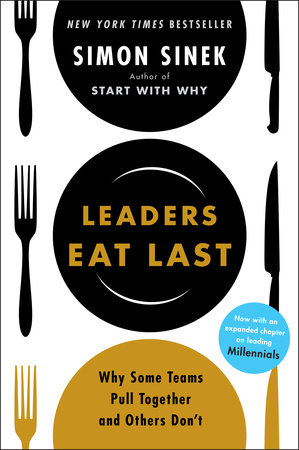 LEADERS EAT LAST: WHY SOME TEAMS PULL TOGETHER AND OTHERS DON'T by Simon Sinek
Imagine a world where almost everyone wakes up inspired to go to work, feels trusted and valued during the day, then returns home feeling fulfilled. This is not a crazy, idealized notion. Today, in many successful organizations, great leaders create environments in which people naturally work together to do remarkable things. The best ones foster trust and cooperation because their leaders build what Sinek calls a “Circle of Safety” that separates the security inside the team from the challenges outside. Sinek illustrates his ideas with fascinating true stories that range from the military to big business, from government to investment banking.
LEADERS EAT LAST: WHY SOME TEAMS PULL TOGETHER AND OTHERS DON'T by Simon Sinek
Imagine a world where almost everyone wakes up inspired to go to work, feels trusted and valued during the day, then returns home feeling fulfilled. This is not a crazy, idealized notion. Today, in many successful organizations, great leaders create environments in which people naturally work together to do remarkable things. The best ones foster trust and cooperation because their leaders build what Sinek calls a “Circle of Safety” that separates the security inside the team from the challenges outside. Sinek illustrates his ideas with fascinating true stories that range from the military to big business, from government to investment banking.
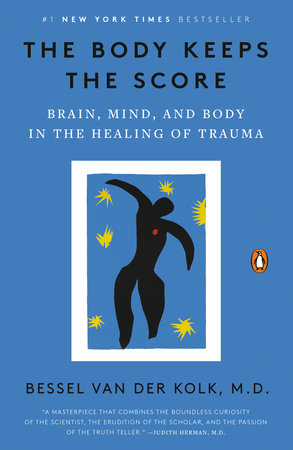 THE BODY KEEPS THE SCORE: BRAIN, MIND, AND BODY IN THE HEALING OF TRAUMA by Bessel van der Kolk, M.D.
One of the world’s leading experts on traumatic stress explains how trauma affects people, its underlying neurobiology, and the many new treatments that are making it possible for sufferers to move beyond trauma in order to reclaim their lives.
THE BODY KEEPS THE SCORE: BRAIN, MIND, AND BODY IN THE HEALING OF TRAUMA by Bessel van der Kolk, M.D.
One of the world’s leading experts on traumatic stress explains how trauma affects people, its underlying neurobiology, and the many new treatments that are making it possible for sufferers to move beyond trauma in order to reclaim their lives.
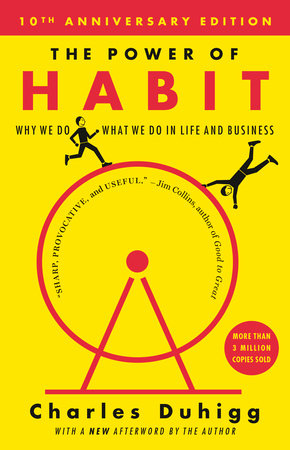 THE POWER OF HABIT: WHY WE DO WHAT WE DO IN LIFE AND BUSINESS by Charles Duhigg
The break-out New York Times bestseller The Power of Habit shows us that by understanding the three-step “loop” all habits form in our brains—cue, routine, reward—we can change our behavior and take control over our lives.
THE POWER OF HABIT: WHY WE DO WHAT WE DO IN LIFE AND BUSINESS by Charles Duhigg
The break-out New York Times bestseller The Power of Habit shows us that by understanding the three-step “loop” all habits form in our brains—cue, routine, reward—we can change our behavior and take control over our lives.
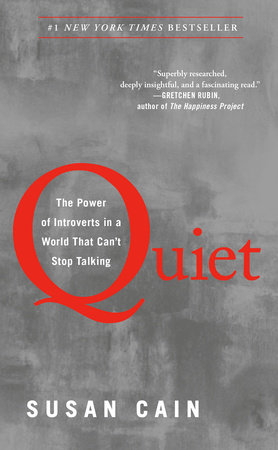 QUIET: THE POWER OF INTROVERTS IN A WORLD THAT CAN'T STOP TALKING by Susan Cain
The book that started the Quiet revolution
In Quiet, Susan Cain argues that we dramatically undervalue introverts and shows how much we lose in doing so. After all, it is to introverts—Rosa Parks, Chopin, Dr. Seuss, Steve Wozniak—that we owe many of the great contributions to society. She charts the rise of the Extrovert Ideal throughout the twentieth century and explores how deeply it has come to permeate our culture. Passionately argued, superbly researched, and filled with indelible stories of real people, Quiet has the power to permanently change how we see introverts and, equally important, how they see themselves.
QUIET: THE POWER OF INTROVERTS IN A WORLD THAT CAN'T STOP TALKING by Susan Cain
The book that started the Quiet revolution
In Quiet, Susan Cain argues that we dramatically undervalue introverts and shows how much we lose in doing so. After all, it is to introverts—Rosa Parks, Chopin, Dr. Seuss, Steve Wozniak—that we owe many of the great contributions to society. She charts the rise of the Extrovert Ideal throughout the twentieth century and explores how deeply it has come to permeate our culture. Passionately argued, superbly researched, and filled with indelible stories of real people, Quiet has the power to permanently change how we see introverts and, equally important, how they see themselves.
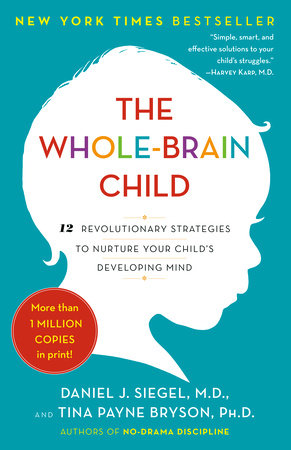 THE WHOLE-BRAIN CHILD: 12 REVOLUTIONARY STRATEGIES TO NURTURE YOUR CHILD'S DEVELOPING MIND by Daniel J. Siegel, Tina Payne Bryson
In this pioneering, practical book, Daniel J. Siegel, neuropsychiatrist and author of the bestselling Mindsight, and parenting expert Tina Payne Bryson offer a revolutionary approach to child rearing with twelve key strategies that foster healthy brain development, leading to calmer, happier children. The authors explain—and make accessible—the new science of how a child’s brain is wired and how it matures. Complete with age-appropriate strategies for dealing with day-to-day struggles and illustrations that will help you explain these concepts to your child, The Whole-Brain Child shows you how to cultivate healthy emotional and intellectual development so that your children can lead balanced, meaningful, and connected lives.
THE WHOLE-BRAIN CHILD: 12 REVOLUTIONARY STRATEGIES TO NURTURE YOUR CHILD'S DEVELOPING MIND by Daniel J. Siegel, Tina Payne Bryson
In this pioneering, practical book, Daniel J. Siegel, neuropsychiatrist and author of the bestselling Mindsight, and parenting expert Tina Payne Bryson offer a revolutionary approach to child rearing with twelve key strategies that foster healthy brain development, leading to calmer, happier children. The authors explain—and make accessible—the new science of how a child’s brain is wired and how it matures. Complete with age-appropriate strategies for dealing with day-to-day struggles and illustrations that will help you explain these concepts to your child, The Whole-Brain Child shows you how to cultivate healthy emotional and intellectual development so that your children can lead balanced, meaningful, and connected lives.
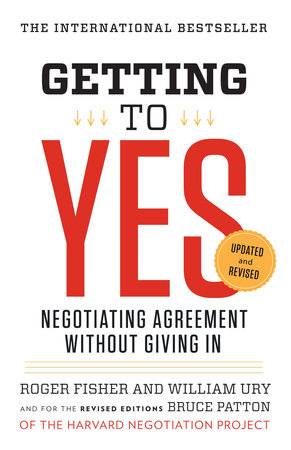 GETTING TO YES: NEGOTIATING AGREEMENT WITHOUT GIVING IN by Roger Fisher, William L. Ury, Bruce Patton
Getting to Yes has helped millions of people learn a better way to negotiate. One of the primary business texts of the modern era, it is based on the work of the Harvard Negotiation Project, a group that deals with all levels of negotiation and conflict resolution. Thoroughly updated and revised, it offers readers a straight- forward, universally applicable method for negotiating personal and professional disputes without getting angry-or getting taken.
GETTING TO YES: NEGOTIATING AGREEMENT WITHOUT GIVING IN by Roger Fisher, William L. Ury, Bruce Patton
Getting to Yes has helped millions of people learn a better way to negotiate. One of the primary business texts of the modern era, it is based on the work of the Harvard Negotiation Project, a group that deals with all levels of negotiation and conflict resolution. Thoroughly updated and revised, it offers readers a straight- forward, universally applicable method for negotiating personal and professional disputes without getting angry-or getting taken.
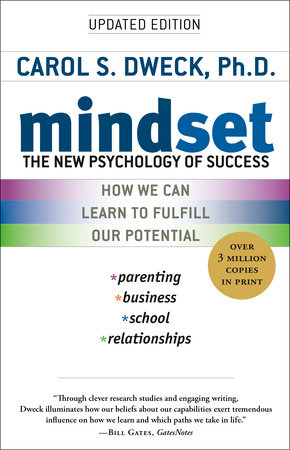 MINDSET: THE NEW PSYCHOLOGY OF SUCCESS by Carol S. Dweck
After decades of research, world-renowned Stanford University psychologist Carol S. Dweck, Ph.D., discovered a simple but groundbreaking idea: the power of mindset. In this brilliant book, she shows how success in school, work, sports, the arts, and almost every area of human endeavor can be dramatically influenced by how we think about our talents and abilities. People with a fixed mindset—those who believe that abilities are fixed—are less likely to flourish than those with a growth mindset—those who believe that abilities can be developed. Mindset reveals how great parents, teachers, managers, and athletes can put this idea to use to foster outstanding accomplishment.
MINDSET: THE NEW PSYCHOLOGY OF SUCCESS by Carol S. Dweck
After decades of research, world-renowned Stanford University psychologist Carol S. Dweck, Ph.D., discovered a simple but groundbreaking idea: the power of mindset. In this brilliant book, she shows how success in school, work, sports, the arts, and almost every area of human endeavor can be dramatically influenced by how we think about our talents and abilities. People with a fixed mindset—those who believe that abilities are fixed—are less likely to flourish than those with a growth mindset—those who believe that abilities can be developed. Mindset reveals how great parents, teachers, managers, and athletes can put this idea to use to foster outstanding accomplishment.
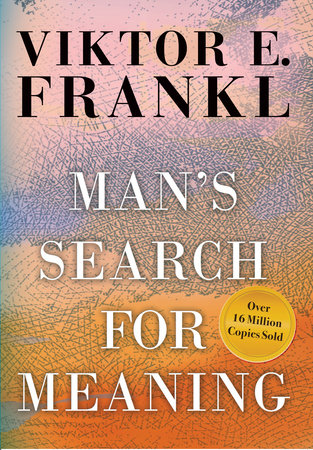 MAN'S SEARCH FOR MEANING by Viktor E. Frankl, Foreword by Harold S. Kushner
Psychiatrist Viktor Frankl's memoir has riveted generations of readers with its descriptions of life in Nazi death camps and its lessons for spiritual survival. Between 1942 and 1945 Frankl labored in four different camps, including Auschwitz, while his parents, brother, and pregnant wife perished. Based on his own experience and the experiences of others he treated later in his practice, Frankl argues that we cannot avoid suffering but we can choose how to cope with it, find meaning in it, and move forward with renewed purpose. Frankl's theory-known as logotherapy, from the Greek word logos ("meaning")-holds that our primary drive in life is not pleasure, as Freud maintained, but the discovery and pursuit of what we personally find meaningful.
For more on these titles visit Top 12 Psychology Titles
MAN'S SEARCH FOR MEANING by Viktor E. Frankl, Foreword by Harold S. Kushner
Psychiatrist Viktor Frankl's memoir has riveted generations of readers with its descriptions of life in Nazi death camps and its lessons for spiritual survival. Between 1942 and 1945 Frankl labored in four different camps, including Auschwitz, while his parents, brother, and pregnant wife perished. Based on his own experience and the experiences of others he treated later in his practice, Frankl argues that we cannot avoid suffering but we can choose how to cope with it, find meaning in it, and move forward with renewed purpose. Frankl's theory-known as logotherapy, from the Greek word logos ("meaning")-holds that our primary drive in life is not pleasure, as Freud maintained, but the discovery and pursuit of what we personally find meaningful.
For more on these titles visit Top 12 Psychology Titles
There’s a Book for That! is brought to you by Penguin Random House’s Sales department. Please follow our Tumblr by clicking here—and share this link with your accounts: theresabookforthat.tumblr.com. Thank you! Did you see something on the news or read about something on your commute? Perhaps you noticed something trending on Twitter? Did you think: “There’s a book for that!”? Then please, send it our way at theresabookforthat@penguinrandomhouse.com
Popular Company News
PRH Acquires Wonderbly, One of the UK’s Fastest-Growing Independent Publishers and Leader in Personalized Gift Books
June 4, 2025
Acquisition Underscores Penguin Random House’s Commitment to Innovation and Growth Penguin Random House, a leading global trade book publisher, has acquired Wonderbly, one of the UK’s…
Former First Lady Michelle Obama to Publish THE LOOK With Crown Publishing Group
June 5, 2025
The Crown Publishing Group today announced THE LOOK, a new book from Michelle Obama, former First Lady of the United States, to be published November 4, 2025.…
Matthew McConaughey, Academy Award-Winning Actor and Author of GREENLIGHTS, to Publish New Book With Crown
June 26, 2025
Crown, an imprint of the Crown Publishing Group, announced the September 16 publication of POEMS & PRAYERS by Matthew McConaughey, an eternal optimist, Academy Award–winning actor,…
Legendary Thriller Author Frederick Forsyth Passes Away at 86
June 10, 2025
Frederick Forsyth, bestselling author, British RAF pilot, and journalist died on Monday, June 9, 2025. He wrote eighteen espionage thrillers including THE DAY OF THE JACKAL, THE…
Penguin Young Readers to Publish Debut Picture Book by Jalen Hurts, Philadelphia Eagles Quarterback and Super Bowl MVP
June 24, 2025
Jalen Hurts, Philadelphia Eagles quarterback and 2025 Super Bowl MVP, will publish his debut children’s picture book with Flamingo Books, an imprint of Penguin Young Readers…
PYR to Publish New Book for Tweens Inspired by the #1 NYT Bestseller, THE ANXIOUS GENERATION
May 21, 2025
Rocky Pond Books, an imprint of Penguin Young Readers, will publish a companion to social psychologist Jonathan Haidt’s #1 New York Times bestselling and culturally transformative…
Penguin Press and Penguin Random House Social Impact Team Partner to Donate THE JAILHOUSE LAWYER to Incarcerated Individuals
June 25, 2025
On July 8, Penguin Press will publish THE JAILHOUSE LAWYER by Calvin Duncan and Sophie Cull. This title is a searing and ultimately hopeful account of…
Tiny Reparations Books Celebrates Their 5th Anniversary and Publication of Tourmaline’s MARSHA
June 4, 2025
On May 22, Tiny Reparations Books celebrated two momentous occasions: the 5th anniversary of the imprint and the launch of the National bestseller MARSHA, Tourmaline’s highly anticipated biography…
Companhia das Letras Recognized in Folha De S. Paulo’s Best Brazilian Books of the 21st Century
June 9, 2025
Folha de S. Paulo, a renowned Brazilian daily newspaper founded in 1921, recently released an issue celebrating the most noteworthy Brazilian literature of the 21st century. …
